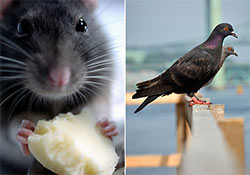Comparative Cognition
 In addition to decision-making, research in our lab is also exploring cross-species analyses of other psychological phenomena. Because many of the concepts originate in the human realm, a major focus of work in the lab is on developing procedures that tap into genuinely complex behavior while, at the same time, respect the ecology and evolutionary history of the animal. Studying such complex behavior in non-verbal animals, such as rats and pigeons, provides insights into possible role language plays in such behavior in humans.
In addition to decision-making, research in our lab is also exploring cross-species analyses of other psychological phenomena. Because many of the concepts originate in the human realm, a major focus of work in the lab is on developing procedures that tap into genuinely complex behavior while, at the same time, respect the ecology and evolutionary history of the animal. Studying such complex behavior in non-verbal animals, such as rats and pigeons, provides insights into possible role language plays in such behavior in humans.
Numerical Cognition
Under what conditions do animals respond to numerical properties of the world? How can judgments of quantity be separated from genuine counting? To what extent does numerical cognition depend on abstract symbolic behavior? Can number sense transfer from one modality to another?
Self-Awareness and Metacognition
In what sense are animals aware of their own behavior? Is this a skill that can be taught? Can they remember and report on some aspect of their own functioning? To what extent can they make confidence judgments about their own behavior? Under what circumstances does this ability transfer across different tasks?
Problem Solving
How do animals solve problems? Can general problem-solving repertoires be established through experience? Under what conditions do animals use tools to solve problems? To what extent does successful problem solving generalize to novel situations?